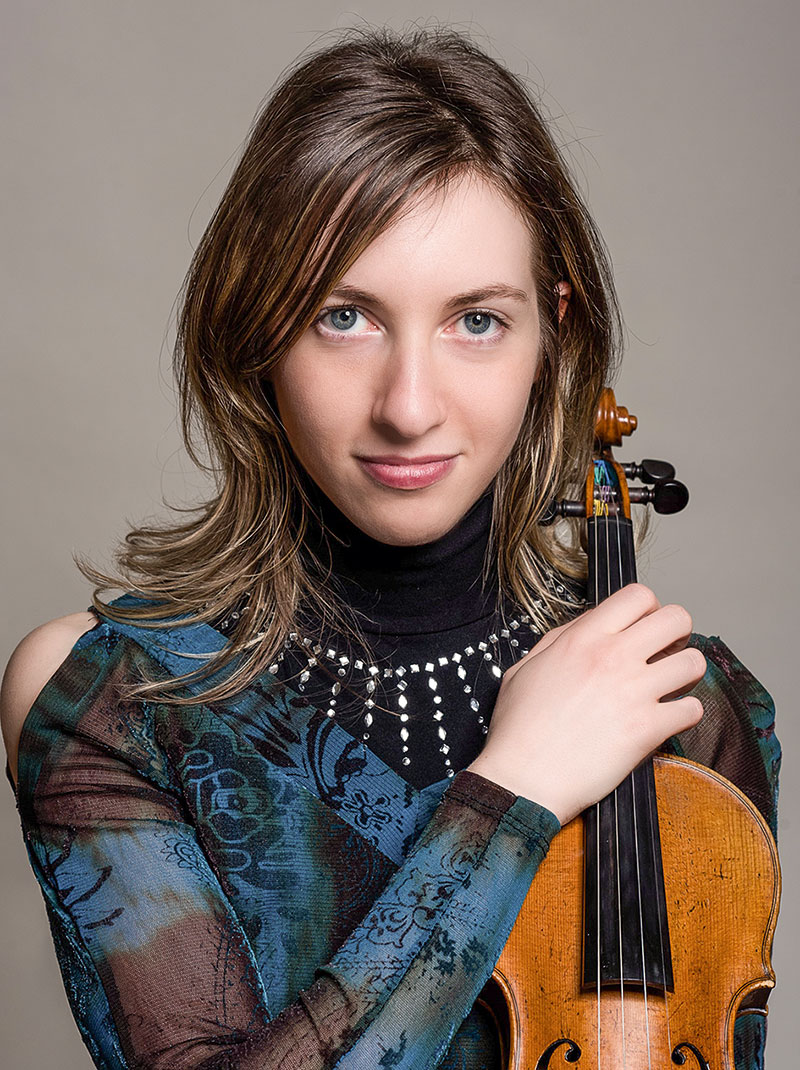The exceptional violinist Giulia Brinckmeier discovered her talent for working as a concertmistress more or less by chance. But today, her dedication and energy are central to the sound of the Bilbao Orkestra Sinfonikoa.

“It’s the simplest story in the world”, that’s how Giulia Brinckmeier describes her baby steps in music. Her mother was a pianist, her father a violinist, and all she had to do was choose—which she soon did: “I was barely even three when my father handed me my first toy violin. So for me, playing the violin went without saying.” As did music in and of itself, which has been the main focus in her life ever since childhood. Which isn’t to say that she was originally anywhere close to thinking about taking a job as an orchestral musician. “I earned my first diploma in Italy when I was 19. At that point in time, I didn’t really know my way around orchestral playing at all—nor was I interested in it.” That would change, however, when she found her way to Vienna via her teacher and mentor Anton Sorokow. It was in 2009 that she began her studies at Vienna’s MUK, from which she transferred two years later to the mdw. “Vienna was where I discovered what it really means to play in an orchestra.” The mdw’s instrumental majors are made aware of how important it is to acquire well-founded training in chamber music and orchestral playing from the very beginning of their studies. This professional orientation in the University’s teaching, says Giulia Brinckmeier, is one of the major differences from studying at an Italian academy—and it does end up leading to a clear qualitative difference between the two countries’ orchestras. “The mdw’s educational offerings, like individual lessons with the Vienna Symphony’s concertmaster or the study of orchestral repertoire with a first violinist of the Vienna Philharmonic, naturally entails all kinds of advantages. In Italy as well as in Spain, where I live now, orchestra members aren’t allowed to hold a teaching professorship. So in this respect, Austria could function as a role model for other countries.”
The Swiss native discovered her knack for the role of concertmistress through a fortunate coincidence. “Back then, playing in a well-known orchestra hadn’t been my goal—my own artistic development always stood front and centre.” She was especially motivated by the high level of preparation shown by the mdw professors, as well as by her fellow students’ high average level. So she ended up not seeking out her role models amongst inaccessible stars, instead looking to students and teachers whose qualities she admired. The concertmasters and -mistresses in Vienna likewise had an influence on her artistic development, and to this day, they motivate her to be a better concertmistress herself.
Her success would move one to think that she made the right choices. And to this day, she remains focussed on her instrument, on deepening her abilities, and on opportunities to develop further. Precisely this focus becomes manifest in her work with the Bilbao Orkestra Sinfonikoa: “As concertmistress, I can and must delve deeper into the repertoire than a tutti player. But I like bearing this responsibility, along with the fact that my actions and my energy affect how the orchestra plays. The challenges are nearly infinite, but I like that, too—and it’ll ultimately help me to become a more complete musician.” What also fascinates her about playing in an orchestra is the magic that occurs while playing as a group. “A hundred people have to follow your gestures or your breath, have to feel what you do and have virtually the same thoughts. Just how such a large number of people can, say, play pizzicato together perfectly is still a mystery to me. And the magic and connectedness that allow it all to happen are truly the best things that orchestral playing has to offer.”
This talented violinist’s one true personal artistic goal is her own development and improvement: “As long as I have a job that allows me to grow musically, I’m satisfied.” But even so, she does dream of working with orchestras and ensembles such as Spira Mirabilis or the Chamber Orchestra of Europe, and of going deeper into various musical styles—such as by playing baroque music on original instruments. She considers everything that provides inspiration to be desirable. Which is also the idea behind her advice for the concertmistresses and -masters of tomorrow: “We have to try and keep our eyes and ears open in all directions and seek out dialogue with the other musicians. And we should also, of course, value our occupation as musicians and feel happy and privileged to be able to spend our lives working with music and art.”

